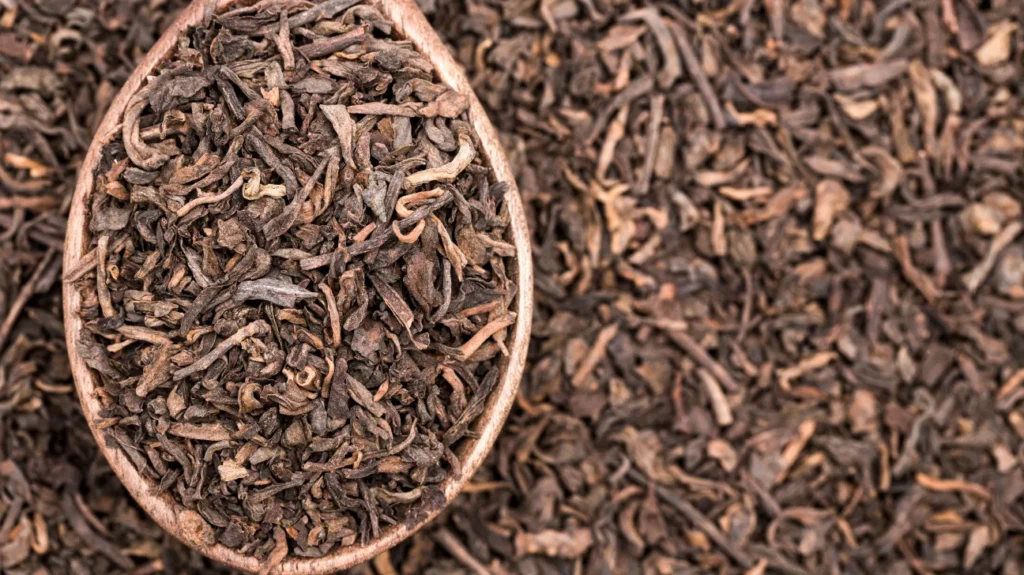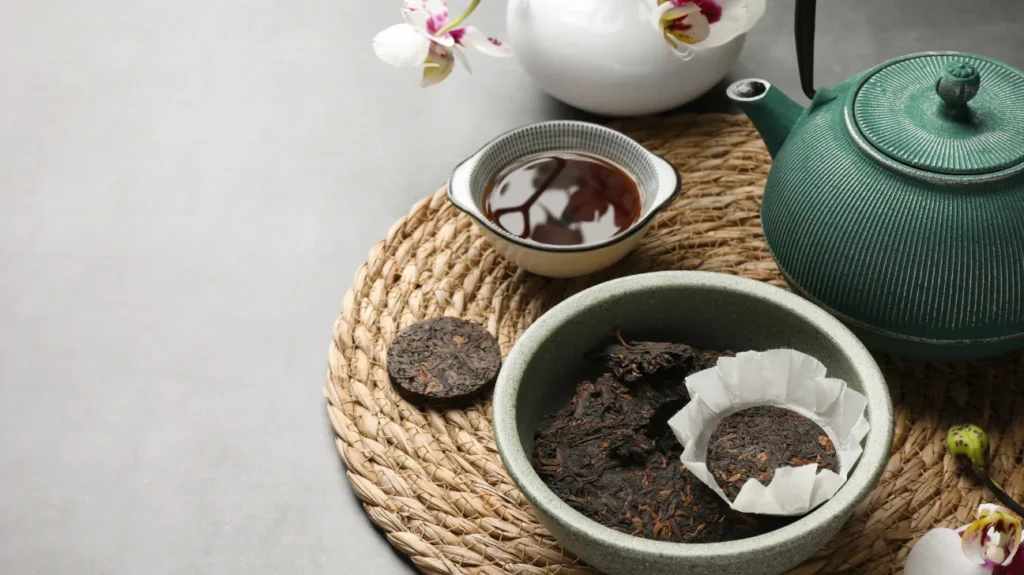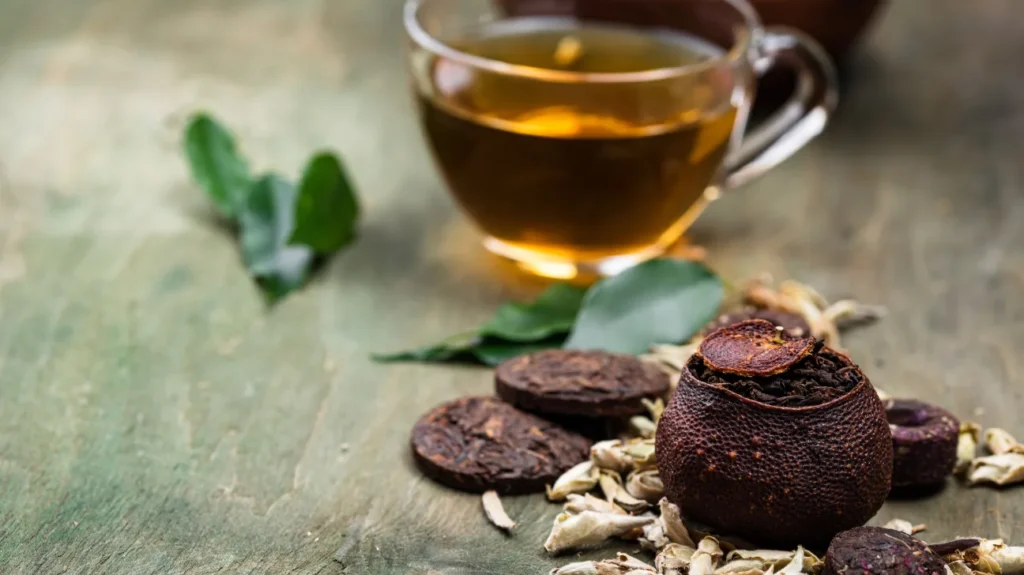Pu-Erh tea, originating from the Yunnan province of China, is a type of fermented tea made from the leaves of the Camellia sinensis plant. Unlike other teas, Pu-Erh undergoes a unique fermentation process, which can enhance its flavor profile and health benefits. With a rich history rooted in traditional Chinese medicine, Pu-Erh tea has gained popularity in the West for its potential health benefits, including weight management and cholesterol regulation. Increasingly, however, it is being explored for its nootropic properties—substances that may enhance cognitive function and mental performance. This article delves into the chemistry, physiological mechanisms, potential nootropic benefits, dosage guidelines, side effects, and interactions of Pu-Erh tea as a supplement, providing comprehensive information for a university graduate-level audience.
You May Also Like:
Sources of Pu-Erh Tea
Pu-Erh tea is produced primarily in Yunnan province, China, where the climate and soil conditions are ideal for growing the Camellia sinensis plant. There are two main types of Pu-Erh tea: Sheng (raw) Pu-Erh and Shou (ripe) Pu-Erh.
- Sheng Pu-Erh: This is the traditional, unprocessed version of Pu-Erh tea. Sheng Pu-Erh is made from freshly picked tea leaves that are allowed to undergo natural fermentation over time. This aging process can take several years, during which the tea develops a complex flavor profile and potential health benefits.
- Shou Pu-Erh: This is a more modern version that undergoes an accelerated fermentation process known as “wo dui.” This method mimics the aging of Sheng Pu-Erh, allowing it to develop a rich, mellow flavor in a shorter time frame.
Both types of Pu-Erh tea are available in various forms, including loose tea leaves, compressed cakes, and tea bags. They are often enjoyed for their distinct earthy flavors and health-promoting properties.
Pu-Erh Tea for Mental Relaxation, Brain Health, and Cognitive Function—Order Now on Amazon!

Chemistry of Pu-Erh Tea
The chemical composition of Pu-Erh tea is complex, containing a variety of bioactive compounds that contribute to its health benefits and nootropic potential. Key components include:
- Polyphenols: Pu-Erh tea is rich in polyphenols, particularly catechins and flavonoids, which are known for their antioxidant properties. The fermentation process may increase the levels of certain polyphenols, enhancing their bioactivity.
- Caffeine: Like all true teas, Pu-Erh contains caffeine, which is responsible for its stimulating effects. The caffeine content in Pu-Erh tea varies based on the type and brewing method, but it typically contains less caffeine than coffee.
- Theanine: This amino acid is found in tea leaves and is known for its calming effects. Theanine could counterbalance the stimulating effects of caffeine, promoting a state of relaxed alertness.
- Other Compounds: Pu-Erh tea also contains alkaloids, polysaccharides, and various minerals that may contribute to its health benefits. These compounds work synergistically to support cognitive function and overall health.

Physiological Mechanisms of Pu-Erh Tea in the Body and Brain
The potential nootropic effects of Pu-Erh tea are attributed to its unique chemical composition and the mechanisms through which its components exert influence on the body and brain.
1. Antioxidant Activity
The polyphenols found in Pu-Erh tea possess potent antioxidant properties. These antioxidants could neutralize reactive oxygen species (ROS) and reduce oxidative stress, which is linked to neurodegenerative diseases and cognitive decline. By protecting brain cells from oxidative damage, the antioxidant effects of Pu-Erh tea may contribute to improved cognitive health and longevity.
2. Enhanced Blood Flow and Neuroprotection
Research indicates that the polyphenols in Pu-Erh tea could improve endothelial function and enhance blood circulation. Improved blood flow to the brain helps ensure that neurons receive adequate oxygen and nutrients, which are vital for optimal cognitive function. Additionally, certain compounds in Pu-Erh tea may offer neuroprotective effects, helping to preserve neuronal integrity and function.
3. Modulation of Neurotransmitters
The presence of caffeine and theanine in Pu-Erh tea could influence neurotransmitter activity in the brain. Caffeine is a well-known stimulant that promotes wakefulness and alertness by blocking adenosine receptors, while theanine has calming effects that could enhance mood and reduce anxiety. This combination may promote cognitive clarity, focus, and overall mental well-being.
4. Weight Management and Metabolic Support
Pu-Erh tea has been associated with weight management due to its ability to enhance lipid metabolism and reduce fat accumulation. By supporting metabolic processes, Pu-Erh tea may help regulate body weight, which could indirectly affect cognitive function. Maintaining a healthy weight is essential for overall health, including brain health, as obesity is linked to cognitive decline and increased risk of neurodegenerative diseases.
Boost Mental and Cognitive Health for a Relaxed, Focused Mind with Pu-Erh Tea—Shop Amazon’s Best!

Nootropic Benefits of Pu-Erh Tea
The exploration of Pu-Erh tea as a nootropic supplement is gaining traction, with several potential benefits for cognitive function, memory, and mental performance.
1. Cognitive Enhancement
The combination of caffeine and theanine in Pu-Erh tea may lead to improved cognitive performance, particularly in tasks requiring attention and focus. The caffeine provides a stimulating effect, while theanine helps reduce the jitteriness often associated with caffeine consumption. This synergy could result in enhanced mental clarity and focus, making Pu-Erh tea a potential ally for studying or demanding cognitive tasks.
2. Memory Support
The antioxidant properties of Pu-Erh tea may contribute to better memory retention and recall. Research suggests that oxidative stress could impair cognitive functions, including memory. By protecting neurons from oxidative damage, the polyphenols in Pu-Erh tea may support overall brain health and cognitive performance, particularly in aging populations.
3. Mood Regulation
The calming effects of theanine, combined with the mild stimulating properties of caffeine, may help regulate mood and alleviate symptoms of anxiety. Improved mood may enhance cognitive performance and motivation, making Pu-Erh tea a beneficial addition for individuals seeking to optimize their mental health.
4. Neuroprotection
The neuroprotective effects of the bioactive compounds in Pu-Erh tea may help guard against neurodegenerative diseases. Preliminary studies suggest that regular consumption of Pu-Erh tea may lower the risk of cognitive decline associated with aging, although more research is needed to establish definitive conclusions.
5. Enhanced Physical Performance
Some studies indicate that the caffeine in Pu-Erh tea may enhance physical performance by increasing endurance and reducing perceived exertion during exercise. Improved physical performance could, in turn, support cognitive function, as physical health is closely linked to mental well-being.

Dosage and Supplementation Guidelines
When considering Pu-Erh tea as a nootropic supplement, it is essential to understand proper dosage and consumption methods.
Recommended Dosage
While there are no established guidelines for specific dosages of Pu-Erh tea, general recommendations can be made based on existing research and traditional consumption practices:
- Daily Consumption: A typical serving size of Pu-Erh tea ranges from 1 to 3 grams of tea leaves per cup. Many tea drinkers consume 1 to 3 cups of Pu-Erh tea daily to enjoy its health benefits.
- Standardized Extracts: For those interested in concentrated forms of Pu-Erh, standardized extracts are available in capsule or powdered form. Dosages can vary; however, a common dosage for extracts may range from 250 to 500 mg per day, based on the concentration of active compounds.
Brewing Methods
The brewing method can influence the potency of the active compounds in Pu-Erh tea. Here are some recommended brewing techniques:
- Water Temperature: Brew Pu-Erh tea with water at 195-205°F (90-96°C) for optimal extraction of flavor and bioactive compounds.
- Steeping Time: Steep the tea for 3 to 5 minutes, depending on personal preference and desired strength. Longer steeping times may result in a more robust flavor but can also increase the astringency.
- Multiple Infusions: Pu-Erh tea can be steeped multiple times, with each infusion providing a slightly different flavor profile and concentration of active ingredients.
Experience Relaxation, Brain Support, and Mental Sharpness with Pu-Erh Tea—Shop Now on Amazon!

Side Effects and Safety
Pu-Erh tea is generally considered safe for most individuals when consumed in moderation. However, some side effects and considerations should be noted:
1. Caffeine Sensitivity
The caffeine content in Pu-Erh tea may lead to side effects in sensitive individuals, such as insomnia, jitteriness, or increased heart rate. Individuals who are sensitive to caffeine or have conditions exacerbated by caffeine consumption should limit their intake.
2. Gastrointestinal Issues
In some cases, consuming Pu-Erh tea may cause digestive discomfort, including nausea or upset stomach. It is advisable to start with smaller amounts and assess individual tolerance.
3. Interactions with Medications
Pu-Erh tea may interact with certain medications, including anticoagulants, antihypertensives, and medications metabolized by the liver. Those taking prescription medications should consult with a healthcare professional before incorporating Pu-Erh tea into their routine.
4. Pregnancy and Breastfeeding
Pregnant and breastfeeding women should exercise caution when consuming Pu-Erh tea due to its caffeine content. It is advisable to consult with a healthcare provider to determine safe levels of caffeine intake during pregnancy.
Interactions with Other Supplements and Medications
The consumption of Pu-Erh tea may lead to interactions with various supplements and medications:
- Stimulants: Combining Pu-Erh tea with other stimulants (such as caffeine-containing supplements) may amplify their effects, leading to increased heart rate or anxiety.
- Blood Thinners: The anticoagulant properties of Pu-Erh tea may enhance the effects of blood-thinning medications, leading to an increased risk of bleeding.
- Antihypertensives: Pu-Erh tea may lower blood pressure, which could interact with antihypertensive medications, potentially leading to excessive drops in blood pressure.
- Liver Metabolism: Certain compounds in Pu-Erh tea may affect liver enzymes involved in drug metabolism, potentially altering the effectiveness of certain medications.

Pu-Erh Tea for Cognitive Health and Overall Well-Being
Pu-Erh tea represents a unique and complex beverage with a rich history and an array of potential health benefits, particularly as a nootropic supplement. Its bioactive compounds, including polyphenols, caffeine, and theanine, work synergistically to help promote cognitive enhancement, memory support, mood regulation, and neuroprotection. While generally safe for most individuals, careful consideration of dosage, potential side effects, and interactions with medications is crucial for safe consumption. As research into the nootropic properties of Pu-Erh tea continues to evolve, it holds promise as a valuable addition to cognitive enhancement strategies and overall health maintenance.
Incorporating Pu-Erh tea into one’s routine may not only enhance cognitive function but also contribute to a holistic approach to health, emphasizing the interconnectedness of mental and physical well-being.

References:
- What Is Pu-erh Tea Good For? Retrieved from: https://www.medicinenet.com/what_is_pu-erh_tea_good_for/article.htm
- Long-term Pu-erh tea consumption improves blue light-induced depression-like behaviors. Retrieved from: https://pubs.rsc.org/en/content/articlelanding/2013/xa/d2fo02780a/unauth
- Pu-erh Tea Restored Circadian Rhythm Disruption by Regulating Tryptophan Metabolism. Retrieved from: https://pubs.acs.org/doi/abs/10.1021/acs.jafc.2c01883
Important Note: The information contained in this article is for general informational purposes only, and should not be construed as health or medical advice, nor is it intended to diagnose, prevent, treat, or cure any disease or health condition. Before embarking on any diet, fitness regimen, or program of nutritional supplementation, it is advisable to consult your healthcare professional in order to determine its safety and probable efficacy in terms of your individual state of health.
Regarding Nutritional Supplements Or Other Non-Prescription Health Products: If any nutritional supplements or other non-prescription health products are mentioned in the foregoing article, any claims or statements made about them have not been evaluated by the U.S. Food and Drug Administration, and such nutritional supplements or other health products are not intended to diagnose, treat, cure, or prevent any disease.


